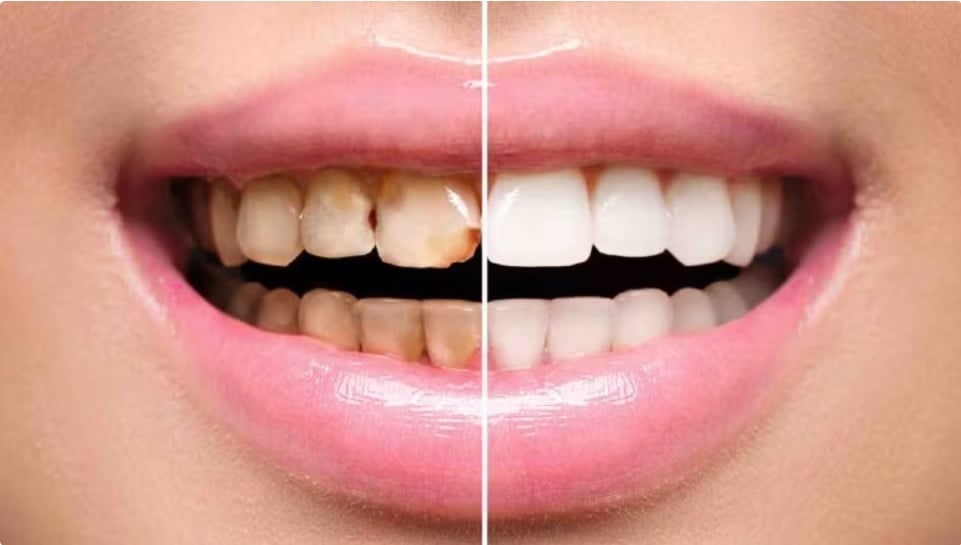How often should I get my teeth cleaned?
Dental calculus (also known as dental calculus) is essentially plaque and food debris left in the oral cavity, often accumulating between teeth and at the base of teeth.
Over time, under the influence of bacteria, these fragments are calcified, depositing into a hard layer of residue that adheres tightly to the teeth and gums. Tartar can be opaque white, yellow-brown or black, not only causing loss of aesthetics but also seriously affecting oral health.
The longer the tartar accumulates, the thicker and darker it becomes, causing many diseases such as: bleeding gums, receding gums, bad breath, enamel erosion, periodontitis, pulpitis, tooth decay, stomatitis, tonsillitis...
Tartar sticks very firmly to the tooth surface, cannot be cleaned with a normal toothbrush but needs to be removed with specialized tools. Dental experts recommend removing tartar periodically every 3-6 months to avoid the above complications.
However, this time period is only a general recommendation. Depending on each person's tooth structure, eating habits and oral hygiene, the rate of tartar formation may be different. Some people should have their teeth scaled more often, including:
- People who regularly use stimulants such as cigarettes, beer, alcohol, coffee... cause tartar to form quickly and in large amounts.
- People with rough tooth enamel create conditions for tartar to easily adhere and accumulate on the teeth and gums.
When should not get tartar removed?
Although scaling has many benefits, it should not be done too often. The use of ultrasonic waves and strong mechanical force can cause damage to teeth and gums, especially if scaling is performed too close together, not allowing the teeth time to "rest".
Patients may experience symptoms such as pain, soreness, sensitivity or even loose teeth. In addition, there are some cases where scaling should not be performed or should be postponed, including:
- People with gingivitis, acute periodontitis, acute necrotizing ulcerative gingivitis.
- People who cannot open their mouth, open their mouth too small, or have a lot of pain when opening their mouth wide.
- People who are uncooperative, have a habit of mouth breathing, or are unable to breathe through their nose.
- People with upper airway obstruction cannot breathe through their nose.
- People with acute pulpitis cannot tolerate cold water or the vibration of the scaling head.
- People with diabetes with severe periodontal complications, or people with salivary diseases such as mumps should not have their teeth cleaned.
- People with blood clotting disorders, or uncontrolled neuromuscular diseases (such as epilepsy, muscle spasms...) ... in these cases, scaling can pose a potential health risk.
Proper oral care to prevent tartar
Although tartar is not a serious problem, it not only reduces aesthetics but also causes bad breath, making patients lose confidence when communicating. Moreover, tartar is also a "residence" for bacteria, increasing the risk of oral diseases.

It is recommended to remove tartar every 3-6 months to avoid harmful effects caused by tartar.
To protect oral health and limit tartar formation, note:
- Choose a soft-bristled, appropriately sized toothbrush and toothpaste containing fluoride.
- Limit the use of toothpicks because they can easily damage the gums; use dental floss to remove leftover food.
- Brush your teeth at least twice a day and use mouthwash or diluted salt water.
- Visit your dentist every 6 months for check-ups and have your teeth cleaned at least twice a year. If you experience any unusual symptoms such as pain, swollen gums, or bleeding, see your doctor immediately for prompt treatment.
In addition to oral hygiene, diet also plays an important role in preventing tartar:
- Limit carbonated drinks and greasy foods.
- Avoid eating foods that are too hot or too cold, especially if you have sensitive teeth or weak enamel.
- Limit foods with colorings that easily stick to teeth such as gummy candies, chocolate, cookies...
- Maintain a scientific diet, limit sugar and starch - two factors that easily create plaque.
In short, scaling teeth properly and at the right time is an important measure to protect oral health. However, it is important to note not to overdo it, follow the instructions of the dentist and combine it with a reasonable care and diet to maintain healthy and beautiful teeth for a long time.
Source: https://suckhoedoisong.vn/loi-ich-khi-lay-cao-rang-khi-nao-khong-nen-lay-cao-rang-169251104231422145.htm




































![[Photo] Cutting hills to make way for people to travel on route 14E that suffered landslides](https://vphoto.vietnam.vn/thumb/1200x675/vietnam/resource/IMAGE/2025/11/08/1762599969318_ndo_br_thiet-ke-chua-co-ten-2025-11-08t154639923-png.webp)










![[Video] Hue Monuments reopen to welcome visitors](https://vphoto.vietnam.vn/thumb/402x226/vietnam/resource/IMAGE/2025/11/05/1762301089171_dung01-05-43-09still013-jpg.webp)

















































![Dong Nai OCOP transition: [Part 2] Opening new distribution channel](https://vphoto.vietnam.vn/thumb/402x226/vietnam/resource/IMAGE/2025/11/09/1762655780766_4613-anh-1_20240803100041-nongnghiep-154608.jpeg)














Comment (0)